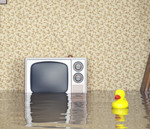With winter already knocking at our doors erratic power supply and regular loadshedding from state-owned power utility Eskom is a reality for many South Africans.
And reliance on electricity becomes most apparent when it is gone. And even more so when you realise an appliance of yours has been damaged due to a power surge. As power surges can cause appliances and other electronic devices to short-circuit, malfunction or even be destroyed, ultimately rendering them unusable.
Whether it’s your fridge, computer, television entertainment set and in particular, many safety systems that are largely reliant on power such as alarm systems and electric fencing become less effective once the back-up batteries run out during extended periods of load shedding.
Therefore you have to implement back up security plans and processes to cover your electric appliances. One such way is to insure them.
And it’s worth speaking to your insurance company or broker to find out what your policy does and doesn’t cover for damage as a result of load shedding as it could be an extra cover that must be added to certain policies.
Most household contents policies have cover in place for damage to electrical equipment and appliances as a result of lightening damage, but deliberate withdrawals of power that caused power surges may not be covered.
Therefore, policyholders are encouraged to ensure that they have additional accidental insurance cover in place to protect against the loss of any items resulting from power surges during the load shedding.
If the policy does not cover surges or flat alarm batteries, take additional cover or find another home insurance policy that does. Home insurance policies that do cover you in the event of power surge damage MiWay, OUTsurance and Santam.











